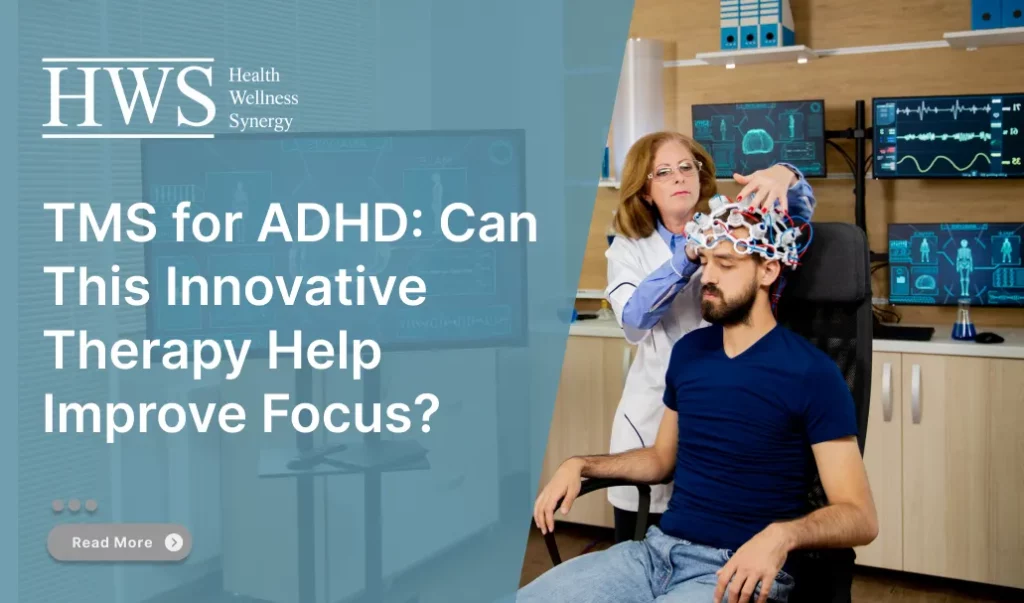
Attention-deficit/hyperactivity disorder (ADHD) affects millions of children and adults across the United States, impacting focus, impulse control, and working memory. For many, traditional ADHD treatment such as medication and talk therapy may only provide partial relief or come with unwanted side effects.
Today, a growing number of TMS studies and clinical trials suggest that TMS for ADHD (Transcranial Magnetic Stimulation) may be a safe and effective way to enhance attention and executive function by directly targeting key brain regions involved in concentration and behavior regulation.
At HWS Center, our board-certified healthcare providers are using this breakthrough TMS therapy to help patients achieve better focus, emotional balance, and sustainable symptom improvement.
TMS therapy is a form of brain stimulation therapy that uses gentle magnetic pulses to stimulate the prefrontal cortex, the target area of the brain responsible for decision-making, attention, and mood regulation.
During each TMS treatment, a small TMS coil placed near the scalp delivers a TMS pulse that activates brain areas involved in working memory and attention. Over several sessions, this treatment process can help normalize brain activity and strengthen brain networks responsible for executive function and response inhibition.
Unlike medication, TMS is a non-invasive treatment method that does not require anesthesia or systemic drugs, making it a promising treatment option for ADHD patients who cannot tolerate or benefit from stimulants.

TMS therapy may be beneficial for individuals who:
Because ADHD often co-occurs with anxiety disorders, bipolar disorder, and post-traumatic stress disorder, addressing multiple health conditions simultaneously can be challenging. TMS offers a holistic approach by targeting brain regions linked to focus, emotion, and mood swings, creating lasting symptom relief.
Before beginning, your healthcare provider will perform a thorough ADHD diagnosis and evaluate your medical history, including potential risk factors such as substance abuse or personality disorder.
During treatment, you’ll sit comfortably while a specialist positions a TMS coil over your scalp. You may feel mild tapping or scalp discomfort as magnetic pulses stimulate specific brain areas. Each session lasts about 20 minutes and is typically repeated five times a week over several weeks, the complete treatment course depends on your treatment plan and desired treatment outcome.
Because TMS is an outpatient treatment method, patients can return to their daily activities immediately after each session.
When applied consistently under a stimulation protocol designed for ADHD patients, TMS therapy may improve:
By targeting the prefrontal cortex and associated brain networks, TMS promotes measurable symptom improvement without systemic side effects. Many patients report positive changes in concentration, productivity, and motivation after completing their treatment plan.

Yes. TMS has been widely researched in the United States for depression and other mood disorders, demonstrating an excellent safety profile. The most common side effects include mild scalp discomfort or light headaches during early sessions.
Because TMS does not involve medication, it eliminates the risks of dependency or interactions common with stimulant-based ADHD treatment or substance use disorders.
If you or a loved one are exploring alternative treatment strategies for ADHD, TMS offers a modern, science-backed approach to improving cognitive function and overall mental wellness.
At HWS Center, we take a personalized approach to ADHD management. Each treatment plan is developed by a board-certified healthcare provider and tailored to your unique cognitive needs.
Our specialists use advanced TMS coils, evidence-based treatment protocols, and precise motor threshold calibration to ensure accurate stimulation of target areas in the prefrontal cortex. Combined with ongoing medication management and supportive talk therapy, our approach promotes comprehensive healing.
With convenient scheduling, secure Patient Portals, and compassionate clinicians, HWS Center remains one of New Jersey’s trusted leaders in TMS therapy for focus, attention, and cognitive balance.
If you’ve been searching for a treatment option that addresses ADHD symptoms without medication, TMS for ADHD may be the breakthrough you’ve been waiting for.
Contact HWS Center today to schedule your Free Consultation and learn how TMS therapy can help you or your loved one regain focus, emotional balance, and long-term mental clarity.
Schedule a consultation! Provide your contact information below and we’ll get back to you as soon as we can.
A typical TMS treatment for ADHD lasts four to six weeks, with short sessions five times per week. Each visit involves mild magnetic stimulation through TMS coils targeting specific brain regions. Your healthcare provider will create a custom treatment plan to match your needs. Most people notice better focus and working memory improvements after several weeks of consistent therapy.
TMS is considered very safe. The most common side effects are mild scalp discomfort or a light headache, usually easing as treatment continues. Unlike stimulant medications, TMS doesn’t impact appetite, sleep, or heart rate. Research across multiple sample sizes in the United States shows minimal complications when performed by a board-certified healthcare provider following approved treatment protocols.
Yes. TMS therapy benefits patients with ADHD and coexisting bipolar disorder, anxiety disorders, or post-traumatic stress disorder. By stimulating brain regions involved in emotion and mood regulation, TMS can reduce mood swings and improve focus. This makes it a valuable addition for individuals managing overlapping health conditions that affect attention, motivation, and emotional stability.
Yes. Healthy lifestyle changes such as regular exercise, quality sleep, and balanced nutrition enhance TMS outcomes. These habits support optimal brain function and stable dopamine release, helping sustain improvements from therapy. Combining TMS with talk therapy, structured routines, and stress management often leads to better treatment outcomes and long-term focus improvement.
According to recent clinical trials, TMS demonstrates a high success rate for individuals with resistant depression, particularly when combined with talk therapy and ongoing medication management.
TMS is a non-invasive brain stimulation therapy that targets the prefrontal cortex to improve attention and executive function. Unlike medications that alter brain chemistry, TMS directly stimulates neural circuits linked to focus and impulse control.
We use cookies to improve your experience on our site. By using our site, you consent to cookies.
Manage your cookie preferences below:
Essential cookies enable basic functions and are necessary for the proper function of the website.
Google reCAPTCHA helps protect websites from spam and abuse by verifying user interactions through challenges.
Google Tag Manager simplifies the management of marketing tags on your website without code changes.
You can find more information in our Cookie Policy and Privacy Policy.